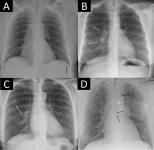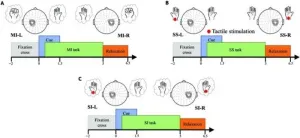(Press-News.org) OAK BROOK, Ill. – A commercial artificial intelligence (AI) tool used off-label was effective at excluding pathology and had equal or lower rates of critical misses on chest X-ray than radiologists, according to a study published today in Radiology, a journal of the Radiological Society of North America (RSNA).
Recent developments in AI have sparked a growing interest in computer-assisted diagnosis, partly motivated by the increasing workload faced by radiology departments, the global shortage of radiologists and the potential for burnout in the field. Radiology practices have a high volume of unremarkable (no clinically significant findings) chest X-rays, and AI could possibly improve workflow by providing an automatic report.
Researchers in Denmark set out to estimate the proportion of unremarkable chest X-rays where AI could correctly exclude pathology without increasing diagnostic errors. The study included radiology reports and data from 1,961 patients (median age, 72 years; 993 female), with one chest X-ray per patient, obtained from four Danish hospitals.
“Our group and others have previously shown that AI tools are capable of excluding pathology in chest X-rays with high confidence and thereby provide an autonomous normal report without a human in-the-loop,” said lead author Louis Lind Plesner, M.D., from the Department of Radiology at Herlev and Gentofte Hospital in Copenhagen, Denmark. “Such AI algorithms miss very few abnormal chest radiographs. However, before our current study, we didn’t know what the appropriate threshold was for these models.”
The research team wanted to know whether the quality of mistakes made by AI and radiologists was different and if AI mistakes, on average, are objectively worse than human mistakes.
The AI tool was adapted to generate a chest X-ray “remarkableness” probability, which was used to calculate specificity (a measure of a medical test’s ability to correctly identify people who do not have a disease) at different AI sensitivities.
Two chest radiologists, who were blinded to the AI output, labeled the chest X-rays as “remarkable” or “unremarkable” based on predefined unremarkable findings. Chest X-rays with missed findings by AI and/or the radiology report were graded by one chest radiologist—blinded to whether the mistake was made by AI or radiologist—as critical, clinically significant or clinically insignificant.
The reference standard labeled 1,231 of 1,961 chest X-rays (62.8%) as remarkable and 730 of 1,961 (37.2%) as unremarkable. The AI tool correctly excluded pathology in 24.5% to 52.7% of unremarkable chest X-rays at greater than or equal to 98% sensitivity, with lower rates of critical misses than found in the radiology reports associated with the images.
Dr. Plesner notes that the mistakes made by AI were, on average, more clinically severe for the patient than mistakes made by radiologists.
“This is likely because radiologists interpret findings based on the clinical scenario, which AI does not,” he said. “Therefore, when AI is intended to provide an automated normal report, it has to be more sensitive than the radiologist to avoid decreasing standard of care during implementation. This finding is also generally interesting in this era of AI capabilities covering multiple high-stakes environments not only limited to health care.”
AI could autonomously report more than half of all normal chest X-rays, according to Dr. Plesner. “In our hospital-based study population, this meant that more than 20% of all chest X-rays could have been potentially autonomously reported using this methodology, while keeping a lower rate of clinically relevant errors than the current standard,” he said.
Dr. Plesner noted that a prospective implementation of the model using one of the thresholds suggested in the study is needed before widespread deployment can be recommended.
###
“Using AI to Identify Unremarkable Chest Radiographs for Automatic Reporting.” Collaborating with Dr. Plesner were Felix C. Müller, M.D., Ph.D., Mathias W. Brejnebøl, M.D., Christian Hedeager Krag, M.D., Lene C. Laustrup, M.D., Finn Rasmussen, M.D., D.M.Sc., Olav Wendelboe Nielsen, M.D., Ph.D., Mikael Boesen, M.D., Ph.D., and Michael B. Andersen, M.D., Ph.D.
Radiology is edited by Linda Moy, M.D., New York University, New York, N.Y., and owned and published by the Radiological Society of North America, Inc. (https://pubs.rsna.org/journal/radiology)
RSNA is an association of radiologists, radiation oncologists, medical physicists and related scientists promoting excellence in patient care and health care delivery through education, research and technologic innovation. The Society is based in Oak Brook, Illinois. (RSNA.org)
For patient-friendly information on chest X-rays, visit RadiologyInfo.org.
END
The field of precision medicine, especially in the context of cancer immunotherapy, has seen significant advancements in recent years. Precision medicine tailors treatment to the unique genetic and molecular profile of each patient, moving away from conventional one-size-fits-all approaches. This personalized strategy aims to minimize side effects and maximize therapeutic efficacy. A key component of this approach is the use of immune checkpoint inhibitors (ICIs), monoclonal antibodies that target immunosuppressive molecules such as PD-1, PD-L1, and CTLA-4. These ICIs have demonstrated considerable ...
In a groundbreaking study recently published, researchers from Zhejiang University have unveiled significant findings that could enhance brain-computer interface (BCI) technologies, marking a crucial step towards more intuitive neuroprosthetic control and advanced rehabilitation therapies. The study, titled "Neural Correlates of Motor/Tactile Imagery and Tactile Sensation in a BCI paradigm: A High-Density EEG Source Imaging Study," employed high-density electroencephalogram (EEG) recordings to delve into the neural dynamics of motor and ...
MIAMI (August 20, 2024) – Inhaler misuse leading to inadequate medication delivery impacts a person’s ability to manage symptoms of chronic obstructive pulmonary disease (COPD), and additional education about proper inhaler use is needed to improve health outcomes, according to two new articles. The articles are published in the July 2024 issue of Chronic Obstructive Pulmonary Diseases: Journal of the COPD Foundation, a peer-reviewed, open-access journal.
COPD comprises several conditions, including chronic bronchitis and emphysema, and can be caused by irritants like smoke or pollution and genetics. The disease affects more than 30 ...
During a pandemic, attention is usually focused on the immediate challenges, such as managing the disease, ensuring safety and coping with disruptions in daily routines. Adversity, while difficult, can sometimes lead to positive effects.
For older adults living in retirement communities, there has been limited research on how the COVID-19 pandemic and its regulatory measures affected them. Additionally, there is scant research on any potential positive effects for this population.
Now, a new study of 98 older adults (median age 86 years) living in a continuing care retirement community in South Florida during COVID-19 reveals ...
UTSA will partner with Texas A&M University to co-lead SECURE Southwest, one of five new regional centers being launched to strengthen U.S. research security.
Under a five-year, $67 million award from the National Science Foundation (NSF), the Safeguarding the Entire Community of the U.S. Research Ecosystem (SECURE) Center aims to strengthen intellectual property and research security by educating members of the research community about security issues and engaging them in a process of collaborative problem-solving.
The ...
A widely used security protocol that dates back to the days of dial-up Internet has vulnerabilities that could expose large numbers of networked devices to an attack and allow an attacker to gain control of traffic on an organization's network.
A research team led by University of California San Diego computer scientists investigated the Remote Authentication Dial-In User Service (RADIUS) protocol and found a vulnerability they call Blast-RADIUS that has been present for decades. RADIUS, designed in 1991, allows networked devices such as routers, switches or mobile roaming gear to use a remote server to validate login or other credentials.
This is a common set-up in enterprise and ...
A study of children’s conversations with their caretakers sheds light on the timeline of the emergence of moral foundation words in the first six years of life in English-speaking children. Moral Foundations theory posits that morality is largely intuitive and underlaid by modular foundations. The original set of five foundations proposed by researchers includes Care/Harm, Fairness/Cheating, Authority/Subversion, Loyalty/Betrayal, and Purity/Degradation. Aida Ramezani and colleagues systematically ...
Political animus between Republicans and Democrats in the United States is alarmingly high, raising fears of undemocratic or even violent actions. An often-touted intervention to prevent political polarization is to identify and correct misperceptions about people’s partisan opponents. Sean Westwood and colleagues sought to empirically test the effectiveness of this strategy. The authors surveyed 9,810 American partisans online from fall 2022 to fall 2023, finding that their opinions of whether ...
A newly discovered code within DNA – coined “spatial grammar” – holds a key to understanding how gene activity is encoded in the human genome.
This breakthrough finding, identified by researchers at Washington State University and the University of California, San Diego and published in Nature, revealed a long-postulated hidden spatial grammar embedded in DNA. The research could reshape scientists’ understanding of gene regulation and how genetic variations may influence gene expression in development or disease.
Transcription factors, the proteins that control which genes in one’s genome are turned on or off, ...
An ongoing survey captures how the Russian invasion of Ukraine affected attitudes in European countries not directly involved in the conflict. Margaryta Klymak and Tim Vlandas examine how the Russian invasion of Ukraine affected economic and political attitudes in eight European countries. The authors took advantage of the timing of the European Social Survey (ESS), which happened to be administered both just before and just after the Russian invasion of Ukraine in February 2022 in eight countries: Switzerland, Greece, Italy, Montenegro, Macedonia, Netherlands, Norway, and Portugal. Overall, the invasion increased support ...




